Politics
Prabowo takes up Indonesian presidency, vows to tackle corruption, other issues
Published
3 months agoon
By
Ekwutos BlogBy Ananda Teresia and Stefanno Sulaiman
JAKARTA (Reuters) -Indonesia’s Prabowo Subianto on Sunday took over as president of the world’s third-largest democracy, vowing to combat internal issues such as corruption that plague the country and to make it more self-sufficient.
The 73-year-old has undergone a remarkable transformation, from being a former military commander facing unproven allegations of rights abuses to sweeping the polls and now leading the country of 280 million people.
Wearing a traditional black hat and navy suit with a woven maroon and golden sarong, Prabowo officially became Indonesia’s eighth president on Sunday morning after he was sworn in during a ceremony at Indonesia’s parliament.
Prabowo, who unsuccessfully ran for the presidency twice before, said in a fiery speech to lawmakers he would be president for all Indonesians and challenged the nation to help him face down the country’s problems.
“We must always realise that a free nation is where the people are free,” Prabowo said, at times raising his voice.
“They must be freed of fear, poverty, hunger, ignorance, oppression, suffering,” he said.

Indonesia’s new President Prabowo Subianto and Indonesia’s new Vice President Gibran Rakabuming Raka react after being inaugurated at the House of Representative building in Jakarta, October 20, 2024. REUTERS/Ajeng Dinar Ulfiana
© Thomson Reuters
Prabowo, who unsuccessfully ran for the presidency twice before, said in a fiery speech to lawmakers he would be president for all Indonesians and challenged the nation to help him face down the country’s problems.
“We must always realise that a free nation is where the people are free,” Prabowo said, at times raising his voice.
“They must be freed of fear, poverty, hunger, ignorance, oppression, suffering,” he said.

Indonesia’s new President Prabowo Subianto claps beside former Indonesian President Joko Widodo during his presidential inauguration at the House of Representative building in Jakarta, Indonesia October 20, 2024. REUTERS/Ajeng Dinar Ulfiana
© Thomson Reuters
In a wide-ranging speech lasting about an hour, Prabowo said self-sufficiency for food was possible within five years, while also pledging to become self-sufficient in energy.
The new president vowed to eradicate corruption and said that while he wanted to live in a democracy, it must be “polite”.
“A difference of opinion must come without enmity … fighting without hating,” he said.
Prabowo won the Feb. 14 contest with nearly 60% of the vote and has spent the past nine months building a formidable parliamentary coalition.
He was joined in the swearing-in ceremony by his running mate, Gibran Rakabuming Raka, 37, the eldest son of outgoing President Joko “Jokowi” Widodo.
GREETING SUPPORTERS
After his speech, Prabowo wore a baseball cap and waved through a car sunroof as he made his way to the presidential palace, passing thousands of flag-waving supporters thronging Jakarta’s streets in a festival-like atmosphere.

Indonesia’s new President Prabowo Subianto is sworn in during his presidential inauguration at the House of Representative building in Jakarta, October 20, 2024. REUTERS/Ajeng Dinar Ulfiana TPX IMAGES OF THE DAY
© Thomson Reuters
Flower boards outside the palace either congratulated Prabowo and Gibran or thanked Jokowi for his decade of service.
Jokowi supporters are also attending the celebrations to bid farewell to Indonesia’s outgoing leader.
Anneta Yuniar, a bystander who had excitedly waved at Jokowi’s motorcade as it slowly made its way past supporters before the ceremony, said she would miss Jokowi but that Prabowo was a strong leader.
“Prabowo will continue the development that Jokowi started. There’s continuity. It’s what I want,” she said.
Jokowi has left an indelible mark on the nation of 280 million, presiding over a period of strong economic growth and massive infrastructure development.
Critics also say, though, his rule has been marked by a rise in old-time patronage and dynastic politics, and they warn about diminished integrity in courts and other state institutions.

Indonesia’s new President Prabowo Subianto is congratulated by outgoing President Joko Widodo on the day of his presidential inauguration, at the House of Representatives building in Jakarta, Indonesia October 20, 2024. REUTERS/Ajeng Dinar Ulfiana
© Thomson Reuters
Indonesian police and military have put in place strict security measures, deploying at least 100,000 personnel across the city, including snipers and anti-riot units.
Prabowo is expected to meet with foreign dignitaries, including a number of heads of state, later on Sunday at the presidential palace, said Hasan Nasbi, the head of the presidential communications organisation.
China sent Vice President Han Zheng to the inauguration, while the delegation from the United States is being led by U.S. Ambassador to the U.N. Linda Thomas-Greenfield.

President-elect Prabowo Subianto waves to journalists as he leaves his residence on the day of his inauguration, in Jakarta, October 20, 2024. REUTERS/Willy Kurniawan
© Thomson Reuters
Prabowo also touched on foreign policy during his speech, saying Indonesia was non-aligned on the global stage, but that he stood in support of the Palestinian people and said Jakarta was ready to send more aid to Gaza.
During his campaign, Prabowo billed himself to voters and investors alike as the “continuity candidate”.
Past allegations against Prabowo of involvement in the kidnapping of student activists and human rights abuses in Papua and East Timor, however, have also raised concern about Indonesia’s trajectory of democracy, human rights advocates say.

Indonesia’s new Vice President Gibran Rakabuming Raka is sworn in during his inauguration at the House of Representatives building in Jakarta, October 20, 2024. REUTERS/Ajeng Dinar Ulfiana
© Thomson Reuters
Prabowo has always denied the allegations that led to his dismissal from the military in 1998, the same year Indonesia broke free from the decades-long authoritarian rule of former President Suharto.
(Reporting by Ananda Teresia, Stefanno Sulaiman, Stanley Widianto , Gayatri Suroyo and Fransiska Nangoy; Writing by Idrees Ali; Editing by Tom Hogue)
You may like


Nigerian woman cries out after allegedly being brut@lised by her husband for ‘wearing singlet to take their children to school’


Niger Explosion: Governance must prioritize human lives through proactive policies – Peter Obi
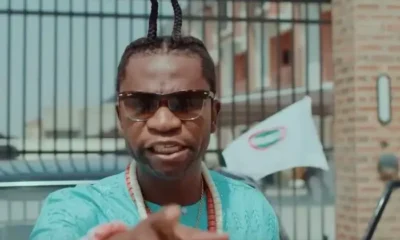

What Speed Darlington posted on Instagram after release from prolonged detention
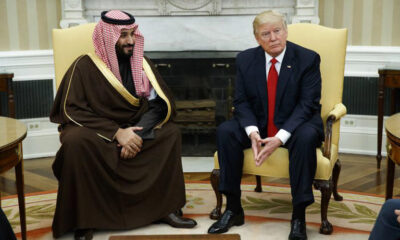

Saudi crown prince says kingdom intends to invest billions in US during call with Trump


The 10 most valuable left-backs in world football in 2025: Calafiori, Gvardiol, Balde…


Abia Govt Begins Major Crackdown On Street Trading, Road Obstructions In Aba
Politics
Niger Explosion: Governance must prioritize human lives through proactive policies – Peter Obi
Published
9 hours agoon
January 23, 2025By
Ekwutos Blog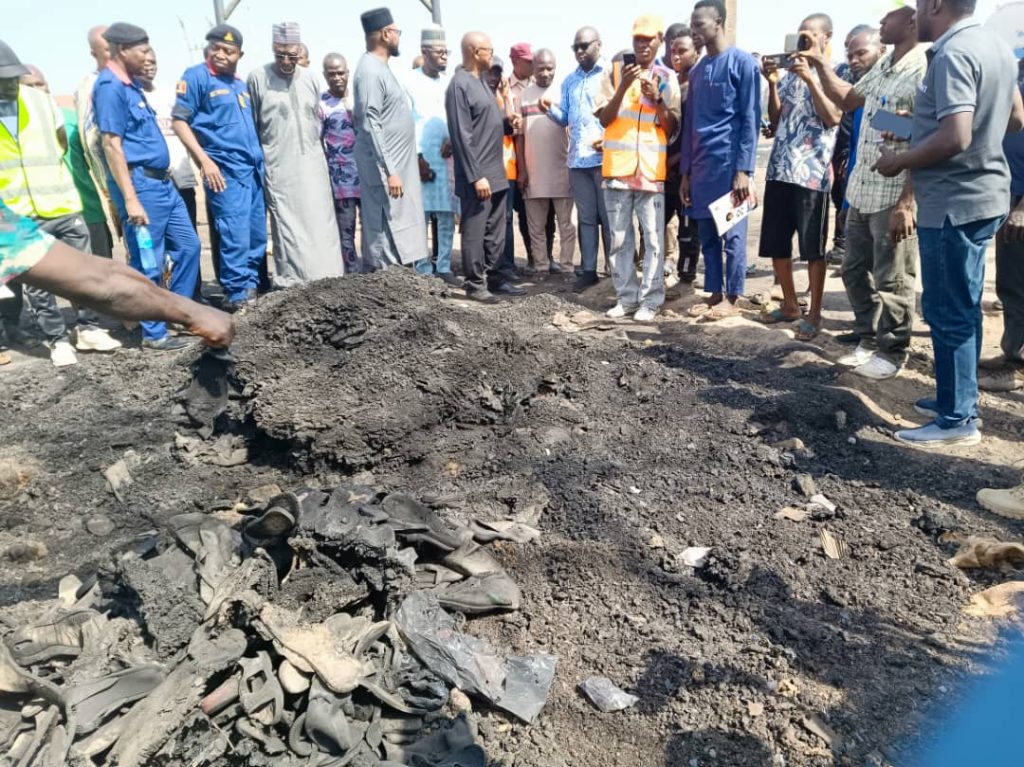
Peter Obi, former governor and 2023 presidential candidate, has called for urgent safety measures to prevent recurring disasters like the tragic petrol tanker explosion that claimed over 100 lives in Suleja, Niger State.
Obi made this appeal during his visit to the site of the explosion, the gravesite, and the Sarkin Dikko palace along the Dikko-Maje Road.
“Today, emotion took the greater part of me as I left Lagos this morning and headed to the site of the tragic petrol tanker explosion, the gravesite, and also the Sarkin Dikko place along the Dikko-Maje Road in Suleja, Niger State, where over 100 lives were lost, more than 50 injured, and many properties destroyed,” Obi shared on his official X handle on Wednesday.
At the explosion site and the graveyard, where 80 victims were buried, Obi expressed sorrow over the preventable tragedy.
He also visited some of the injured victims at the hospital, offering them support and encouragement.
“These recurring disasters call for urgent safety measures: repairing roads, more enlightenment of tanker vehicle operators, investing in healthcare, and lifting people out of poverty to prevent such heartbreaking losses,” he added.
Obi extended his condolences and solidarity to the Dikko community during his meeting with Sarkin Dikko and his council.
He revealed the importance of proactive governance to safeguard human lives.
“Human lives are invaluable, and governance must prioritize their protection through proactive policies,” he stated.
“Together, we can ensure such tragedies become a thing of the past,” he said.
Politics
Saudi crown prince says kingdom intends to invest billions in US during call with Trump
Published
10 hours agoon
January 23, 2025By
Ekwutos Blog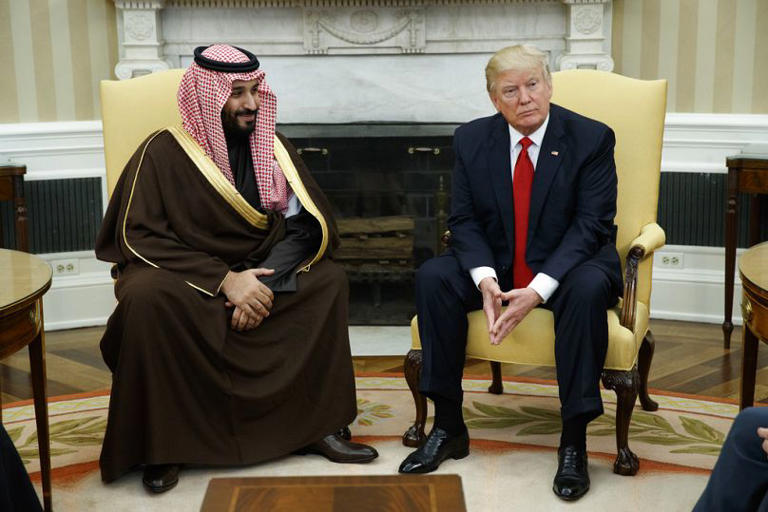
Saudi Arabia’s crown prince said on Thursday that the kingdom wants to invest $600 billion (€576 billion) in the United States over the next four years after a phone call with US President Donald Trump.
Crown Prince Mohammed bin Salman’s comments come after Trump mused about returning to Saudi Arabia as his first foreign trip back in office.
State-run Saudi Press Agency said, “the crown prince affirmed the kingdom’s intention to broaden its investments and trade with the United States over the next four years, in the amount of $600 billion (€576 bn), and potentially beyond that.”
The agency did not elaborate on exactly how the money would be spent.
During their conversation, the two also reportedly discussed ways the two countries could cooperate to establish peace, security and stability in the Middle East.
There was no immediate response from the White House regarding the call. It also wasn’t clear whether Trump’s call with the crown prince was his first with a foreign leader since returning to the Oval Office.
However, it was his first reported abroad.
Trump’s relationship with Saudi Arabia
After his inauguration, Trump talked about the possibility of heading to the kingdom again as his first foreign trip, like he did in 2017.
“The first foreign trip typically has been with the UK but… I did it with Saudi Arabia last time because they agreed to buy $450 billion (€429 bn) worth of our products,” Trump told journalists in the Oval Office.
“I think I’d probably go (again),” the recently inaugurated leader said.
In recent years, the US has increasingly pulled away from relying on Saudi oil exports — once the bedrock the relationship between the two nations.
Trump maintained close relations with Saudi Arabia, even after the crown prince was embroiled in controversy after he was implicated in the 2018 murder of Washington Post columnist Jamal Khashoggi in Istanbul.
The billion dollar pledge, which dwarves the gross domestic product of many nations, comes as the kingdom faces budgetary pressures of its own. Global oil prices remain depressed years after the height of the coronavirus pandemic, affecting the kingdom’s revenues.
Meanwhile, the crown prince has continued to invest in NEOM, a new city in the Saudi Arabian desert. The country also needs to build tens of billions of dollar’s worth of new stadiums and infrastructure ahead of the 2034 FIFA World Cup, which it is hosting.
Politics
Zelensky dampens hopes Trump could strike peace deal with Putin
Published
1 day agoon
January 22, 2025By
Ekwutos Blog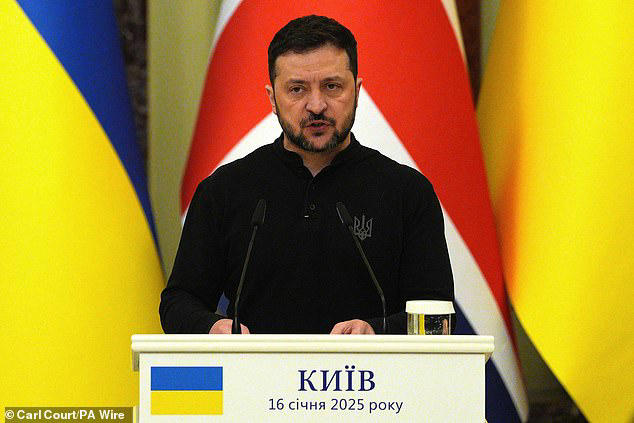
Volodymyr Zelensky has insisted that Ukraine will never recognise occupied Ukrainian territories as being part of Russia, even if pressured to do so by allies, dampening hopes that Donald Trump may be able to strike a peace deal.
‘No matter what anyone wants, even if all the allies in the world unite, we will never recognise the occupied territories [as part of Russia]. This is impossible,’ the Ukrainian president emphasised.
‘We will not legally recognise them. For us, they will always remain occupied territories until we liberate them.’
Trump, who took office for a second term on Monday and was last in power before Russia launched its full-scale invasion of Ukraine, has repeatedly said he could end the war swiftly, without specifying how.
His newly-appointed Secretary of State Marco Rubio said on Tuesday that ending the war was a priority for the president, but would only be possible if both sides make significant concessions.
‘Anytime you bring an end to a conflict between two sides, neither of whom can achieve their maximum goals, each side is going to have to give up something,’ he told CNN, adding that ultimately the decision would be down to the Ukrainians and Russians.
It comes after Russian Deputy Foreign Minister Sergei Ryabkov said today that Moscow sees a small window of opportunity to forge agreements with the new US administration.
‘We cannot say anything today about the degree of the incoming administration’s capacity to negotiate, but still, compared to the hopelessness in every aspect of the previous White House chief (Joe Biden), there is a window of opportunity today, albeit a small one,’ Ryabkov said, according to Interfax.
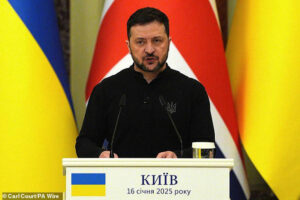
Volodymyr Zelensky has insisted that Ukraine will never recognise occupied Ukrainian territories as being part of Russia
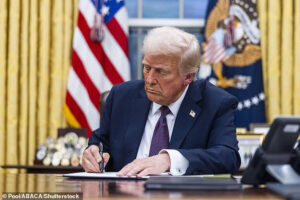
Donald Trump, who took office for a second term on Monday, has said he could end the war swiftly, without specifying how

A Russian soldier fires a self-propelled gun
‘It’s therefore important to understand with what and whom we will have to deal, how best to build relations with Washington, how best to maximise opportunities and minimise risks,’ he said, speaking at the Institute for US and Canadian Studies, a think-tank in Moscow.
Trump warned on Tuesday that he would likely impose more sanctions on Russia if President Vladimir Putin refused to negotiate to end the nearly three-year-old conflict.
He gave no details on the possible additional sanctions on Russia, which is already under significant Western sanctions over the war.
The new president also issued a blow to the Kremlin on Tuesday, accusing Putin of ‘destroying Russia‘ with his failed war as he urged him to ‘make a deal’ to end the conflict.
‘He has to make a deal. I think he is destroying Russia by not making a deal,’ Trump said in a stark warning to the dictator.
‘I think Russia is going to be in big trouble,’ he added, saying that Putin ‘can’t be thrilled that he’s not doing so well.’
‘I mean, he works hard, but most people thought the war would be over in about a week, and now it’s been three years, right?’
The Russian economy was sinking, he went on, with inflation a major threat.
Putin, 72, earlier said he was ready to engage with Trump but still insisted on an outcome favouring Russia.
‘We are open to dialogue with the new US administration on the Ukrainian conflict. The most important thing here is to eliminate the root causes of the crisis,’ said the Russian ruler. An initial phone call is expected by Moscow to take place soon.
Trump said Zelensky was ready for a deal to halt the debilitating conflict, and the 78-year-old US leader said he planned to meet Putin with whom he had a ‘great relationship’ during his first term.
‘We’re going to try to do it as quickly as possible. You know, the war between Russia and Ukraine should never have started.’
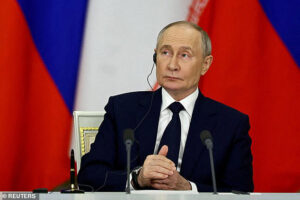
Trump warned on Tuesday that he would likely impose more sanctions on Russia if President Vladimir Putin refused to negotiate to end the nearly three-year-old conflict
After months of Ukraine occupying parts of Russia’s Kursk region as it aims to improve its position in the event of talks, Zelensky stated that any dialogue could only go ahead with Kyiv in a position of strength.
‘Putin cannot be treated as legitimate in this situation. He has violated everything. He must understand his transgression,’ the Ukrainian president said today, adding that if Putin was ‘approached as an equal – that would be a loss for Ukraine.’
But, he said, his government’s top priority was to find a way to halt the war, which has claimed the lives of at least 43,000 Ukrainian soldiers, according to figures released by Ukraine in December.
‘We must find all possible ways to end the hot phase of the war. This is the number one issue,’ Zelensky said.
‘There can be many talks, but the main goal is to stop the active phase. This is the first guarantee of security.’
Russia has occupied Crimea since its 2014 invasion of the territory. Months later it took large parts of the Donbas region, launching a was under the guise of a separatist uprising.
Since the full-scale invasion in 2022, Russian forces have controlled large swathes of southern and eastern Ukraine.
Meanwhile, since a surprise attack in August, Kyiv’s forces occupy around 600 sq km of Russian territory.

Nigerian woman cries out after allegedly being brut@lised by her husband for ‘wearing singlet to take their children to school’

Niger Explosion: Governance must prioritize human lives through proactive policies – Peter Obi

What Speed Darlington posted on Instagram after release from prolonged detention
Trending
- Politics11 months ago
Nigerian Senate passes Bill seeking the establishment of the South East Development Commission.

 Business11 months ago
Business11 months agoInflation hits record high of 29.90% on naira weakness

 Politics8 months ago
Politics8 months agoBREAKING: Federal Gov’t Offers To Pay Above N60,000, Reaches Agreement With Labour

 SportsNews11 months ago
SportsNews11 months agoOlympic Qualifiers 2024: CAF Confirms Dates For Super Falcons Vs Banyana Banyana

 Trending3 months ago
Trending3 months agoNYA demands release of ‘abducted’ Imo chairman, preaches good governance
- Business3 months ago
US court acquits Air Peace boss, slams Mayfield $4000 fine

 Politics3 months ago
Politics3 months agoMexico’s new president causes concern just weeks before the US elections

 Politics11 months ago
Politics11 months agoGovernor Hope Uzodinma’s New Cabinet In Imo: The Gainers, The Losers

